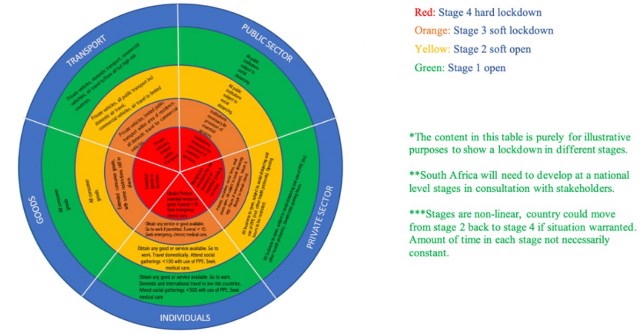DA proposes Smart Lockdown as a sustainable approach to save lives
The Democratic Alliance’s Policy Unit has been working tirelessly with healthcare and financial experts, policy specialists, and our Shadow Cabinet to devise a sustainable and flexible Smart Lockdown to supplement government’s coronavirus response effort, while protecting the South African economy and the livelihoods which depend on it.
We will be submitting our Smart Lockdown working paper to President Cyril Ramaphosa today. As a working paper, the document can be easily updated and amended to mirror the changing circumstances surrounding South Africa’s fight against Covid-19. This is part of our contribution to work collaboratively in the fight against this pandemic.
Managing Covid-19 will require a marathon, not a sprint. Realistically, South Africa may have to contain the coronavirus right up until a vaccine is widely available in 18-24 months’ time. We must hope for a shorter period but plan pragmatically for a long one.
In addition to this, South Africa was already in recession before the coronavirus hit. Under a hard lockdown we are heading toward an economic depression. It is going to be very hard to fund an adequate health response over that time period, while also bridging poor households and small businesses to the other side. Therefore, we need to contain this virus over the coming year and beyond in such a way that as many of us as possible can get back to work.
There is mounting support globally for a phased strategy and moving between different stages of restriction. It would be imprudent to call for a complete easing of all restrictions relating to the current lockdown, as it would likely risk a sudden spike in infections. At the same time, continued hard lockdown conditions will increase the number of unemployed citizens, and close businesses which will not be in a position to reopen after the crisis. A phased strategy gives South Africa the flexibility to adapt to changing circumstances, and it gives people an incentive to comply with regulations.
We believe that it is a false choice to distinguish between a loss of lives and a loss of livelihoods. Given that economically active citizens pay for our food, hospitals, and doctors, an economic collapse as the result of a continued hard lockdown will also equate to a loss of life. South Africa needs a strategy to balance the containment of Covid-19 and the containment of the economic fallout as a result of the lockdown, addressing the twin threat to South African lives: the spread of infection and grinding economic recession.
The DA has devised the Smart Lockdown for the following reasons:
1. The lockdown in its current form is not a feasible approach to contain the coronavirus in South Africa. In our context it is impossible for individuals living in townships and informal settlements to self-isolate, to practice the level of hygiene necessary to kill the virus, and to acquire the protective equipment necessary to keep the virus at bay.
2. Regardless of when the lockdown ends, South Africa cannot immediately go back to business as usual. We need a phased and flexible approach to ease the lockdown while ensuring that we contain the spread of the coronavirus, bearing in mind that Covid-19 will not simply disappear once the lockdown is lifted. Our Smart Lockdown is a sustainable and implementable solution to this.
3. South Africa cannot afford a hard lockdown. The economic repercussions of a hard and extended lockdown will be disastrous for the South African economy, and thousands of taxpaying citizens will emerge from it unemployed as a result. Furthermore, South Africa does not have the fiscal space necessary to accommodate the severe assault a hard lockdown will unleash on our economy. Leading economists Jameel Ahmad and Dawie Roodt have already predicted that the South African GDP will contract between 4 and 6% in the second quarter of 2020. We must be urgently planning to address this scenario once the lockdown begins to ease.
How does the Smart Lockdown work?
The DA’s Smart Lockdown functions similarly to a load shedding grid or the different stages of water restrictions previously seen during the Western Cape drought, both strategies that are familiar to South Africans. It provides different stages of lockdown relative to the national coronavirus infection rate for every sector of the South African economy and society. The complete Smart Lockdown working paper can be found here. In addition to the introduction of the Smart Lockdown, our Covid-19 strategy for managing lives and livelihoods includes:
Moving between lockdown stages (different specified stages of economic and social activity) in response to what the data is telling us e.g. about new daily infections and hospital capacity.
Massive rollout of testing, tracking, tracing, and treatment coupled with transparent reporting of data.
Massive build of healthcare capacity coupled with transparent reporting of progress data.
Enabling and strict enforcement of the wearing of protective face masks in all public areas.
The roll out of a comprehensive public education campaign: hygiene, diagnosis, handling. This includes health protocols for public spaces and workplaces;
Assistance to the high-risk group to continue isolating where possible.
Strict border control.
Bold economic stimulus/relief package
Sweeping reforms in government and to our economy
Our flexible and implementable Smart Lockdown is demonstrated in the following graphic:
STAGES OF A SMART LOCKDOWN

The Smart Lockdown is comprised of four stages:
Red: Stage 4 (hard lockdown)
Orange: Stage 3 (soft lockdown)
Yellow: Stage 2 (soft open)
Green: Stage 1 (open)
The details of each stage can be found in the extended working document, and can be amended in conjunction with relative stakeholders and government officials.
By implementing the Smart Lockdown, South Africa can not only continue to contain the coronavirus outbreak, but ensure the revival of our ailing economy. Furthermore, through stimulus packages and policy reform we can cushion South Africa against the economic fallout of the existing lockdown, and utilise the proposed public education campaigns to begin to prepare the nation for the necessary lifestyle changes we will have to implement once the lockdown eases and is gradually lifted.
We need to remember that the South African context is unique, and that a tailored approach to contain the virus is necessary to protect us against not only the threat of the coronavirus to our lives, but the threat of contingency measures to contain the virus on our livelihoods. Through our Smart Lockdown, we believe that we can protect both lives and livelihoods, ensuring that South Africa defeats the coronavirus and emerges from the outbreak with a capable and competitive economy which will sustain and create jobs, and ultimately pay for the provision of health care services at the scale required to defeat the coronavirus. This is the only way forward, and President Cyril Ramaphosa must consider our measured, flexible and smart approach to South Africa’s coronavirus lockdown as a matter of urgency.
Statement issued by DA Interim Leader, John Steenhuisen, 13 April 2020

